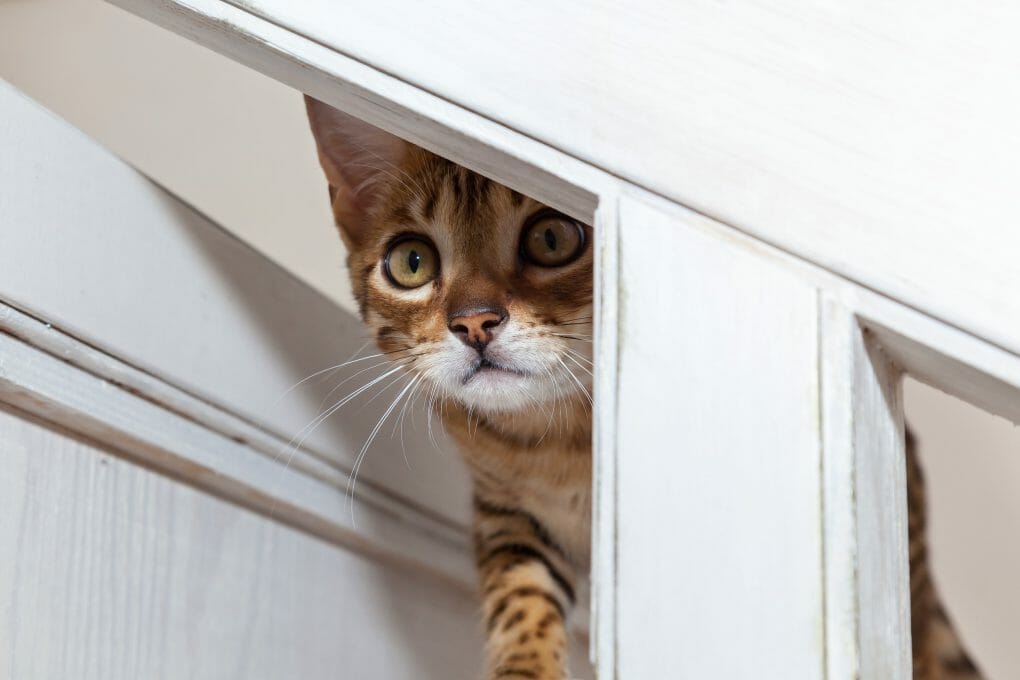Are Bengal Cats Aggressive: Reasons for This Breed’s Aggression and How to Avoid It
Yes, Bengal cats can be aggressive. Bengal cats have intense hunting and killing instincts, but this isn’t always the case. Most Bengal cat attacks are only carried out when they feel threatened or defend their territory.
This breed is especially prone to becoming aggressive with other cats if they’re not socialized from a young age. Bengals can be very destructive when they’re angry. If you do encounter a Bengal cat and it shows any aggression, back away slowly and avoid any confrontation.


Your Bengal cat may bite you due to playfulness or hunting instincts, or it could be a sign of aggression or fear. If you own a Bengal cat and notice it is getting more aggressive, it’s crucial to take action before things get out of hand. There are many ways to address cat aggression – some require professional help. If you don’t know where to turn, speak to your veterinarian or a cat behaviorist.
Table of Contents
Reasons Bengal Cats Can Be Aggressive
Bengal cats have solid personalities and aggressive tendencies, which we can attribute to their unique breed history. As a Bengal cat owner, it’s essential to understand why Bengal cats can be fierce. Territoriality or insecurity can be at the heart of the problem, as may pain, hunger, and boredom.
They Aren’t Neutered or Spayed
If Bengal cats are not neutered or spayed, they may become aggressive if left unchecked. Territoriality is a common trait in these felines; unaltered Bengals must mark their territory aggressively.
Once this occurs, it usually subsides after the cat is neutered or spayed. So if you’re concerned about your cat’s behavior and want to consult a vet on the best way to handle the situation, do not hesitate.
Boredom
Boredom is a common issue for many cats, but when it becomes a problem, things can start to go wrong. Your Bengal cat may lash out at you to get your attention. You can give them toys and play with them outside. If this doesn’t work, you might need professional help as the cat may be experiencing a behavioral disorder.
Human Influence
Human influence is something that cat owners need to be aware of. Unfortunately, Bengals can be pretty aggressive when it comes to humans – this aggression often has a root cause that you can only avoid through proper socialization and training from a young age.
If you are feeling anxious or threatened by your cat, you can take steps to help reduce the chances of an attack happening in the first place.
Providing plenty of toys and playtime will make them happy and less likely to feel territorial or aggressive toward humans. In addition, creating an environment where cats feel safe and secure is essential if you want them to live peacefully with you – remember, never leave food out where they can reach it!
Health Issues


If you notice that your Bengal cat is behaving aggressively or seems to be in pain, it’s essential to get them checked out as soon as possible.
There are several health problems your cat could be experiencing, including parasites, urinary tract infections, and food allergies. For example, suppose the problem persists despite treatment or any suspicion of Feline Leukemia (or Feline Immunodeficiency Virus-FIV) being involved. In that case, it may be best to have your cat tested for these diseases.
If tests come back positive, you’ll need to provide extra nutrition and keep them warm during cold weather conditions. Keeping an eye on behavior can also help identify potential issues early on – which would allow for more appropriate care plans to be already put into place!
Inadequate Training
One of the most common reasons Bengal cats attack their owners is if they have yet to be adequately socialized or trained from a young age.
Poor training can include incorrect environmental stimuli, such as isolation or needing more playtime with other cats. If you think your cat may be attacking out of aggression, it is essential to take them to see a vet for an examination and possible treatment.
Past Trauma
There is a lot of speculation surrounding the cause of aggressive behavior in cats. However, one thing that is known for sure is that cats who have experienced past trauma can become very aggressive.
This may include being abandoned or neglected, living in an environment with other aggressive cats, or even witnessing violence toward their family members. If your cat may suffer from this behavioral problem, it’s best to consult a vet, as aggression often necessitates professional treatment.
How to Avoid Bengal Cat Aggression
Simulate Hunting Behavior in Your Playtime
Bengal cats have a high-energy playstyle, and playing games together can help you to get to know them better. Games like “cat and mouse” help simulate the hunting behavior Bengal cats are used to while taking timeouts when things get too intense will keep everyone safe. But, as Bengal cat owners, always use caution – they’re potent animals that can pack a punch!
Use a Distracting Technique
In cases where a Bengal cat’s aggressive behavior gets out of hand, it is best to try using a distracting technique. Some of the most common methods include playing with them or throwing a toy for them to play with. Of course, feeding them their favorite food can also help calm them down.
Socializing
Not only will socializing your Bengal cat help them develop social skills, but it will also help them be less aggressive and bite people or animals in the future. For best results, make them spend time with other cats and introduce your cat to different people and places.


Socialization is the process of helping cats become accustomed to and comfortable with new environments, people, and other animals. Raising a well-adjusted and friendly cat is essential, which can help prevent aggression and other behavior problems.
Socialization helps cats learn how to interact with the world around them positively and appropriately. It can help them develop confidence and reduce anxiety and fear, leading to more relaxed and less aggressive behavior.
To socialize a cat, it is essential to expose them to various new experiences and environments during the early stages of its life, when they are most receptive to learning. This can include introducing them to different people, places, and animals and providing them with plenty of opportunities to explore and play.
Being patient and considerate when introducing your cat to new things and going at a comfortable pace is also essential. For example, if your cat becomes anxious or aggressive, it may be necessary to take a step back and try again later.
Overall, socialization is integral to raising a well-adjusted and friendly cat and can help prevent aggression and other behavior problems.
